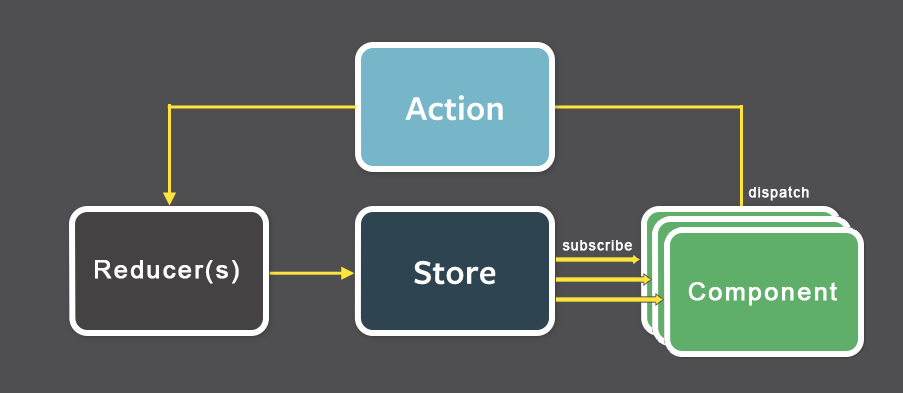Redux with Angular & ngrx
Web apps become increasingly complicated
Everything is connected to everything
Ever-changing state
Changing something
breaks
something somewhere
Solution ?
Redux
Predictable state container for JavaScript apps
Inspired by / Based on
Flux architecture
(unidirectional data flow)
CQRS
(Command Query Responsibility Segregation)
Event sourcing
(application state changes as a sequence of events)
Immutables
Concepts

3 fundamentals principles
Single source of truth
The state of your whole application is stored in an object tree within a single store
{
todos: [
{
text: 'Consider using Redux',
completed: true,
},
{
text: 'Keep all state in a single tree',
completed: false
}
],
filter: 'SHOW_ALL'
}State is read-only
The only way to change the state is to emit an action, an object describing what happened
{
type: 'ADD_TODO',
text: 'Visit delair.aero'
}{
type: 'SET_VISIBILITY_FILTER',
filter: 'SHOW_COMPLETED'
}Changes as pure functions
To specify how the state tree is transformed by actions, you write pure functions (reducers)
function todos(state = {}, action) {
switch (action.type) {
case 'ADD_TODO':
return {
...state,
todos: [
...state.todos,
{
text: action.text,
completed: false
}
]
}
case 'SET_VISIBILITY_FILTER':
return {
...state,
visibilityFilter: action.filter
}
//...
}
}Easier to reason about
Easier to debug or inspect
Benefits
Dev tools (time travel & HMR)
Easier to test
ngrx
Implementation of Redux on top of Angular & RxJS
Demo
@ngrx/store
RxJS powered state management for Angular applications, inspired by Redux
Selectors
Selectors can compute derived data, to store minimal possible state
Selectors are efficient (pure function). A selector is not recomputed unless one of its arguments change (memoization)
Selectors are composable. They can be used as input to other selectors
Demo
@ngrx/effects
Side Effect model for @ngrx/store to model event sources as actions
Demo
@ngrx/entity
Entity State adapter for managing record collections
State Normalization
Each type of data gets its own "table" in the state
Each "data table" should store the individual items in an object
Any references to individual items should be done by storing the item's ID.
Arrays of IDs should be used to indicate ordering.
Demo
@ngrx/router-store
Bindings to connect the Angular Router to @ngrx/store
Conclusion
You might not need Redux
You’ll know when you need Redux
Long learning curve
Great development experience
Fits well with Angular
Ressources
Questions ?
Redux with Angular & ngrx
By Bruno Baia
Redux with Angular & ngrx
- 1,383
